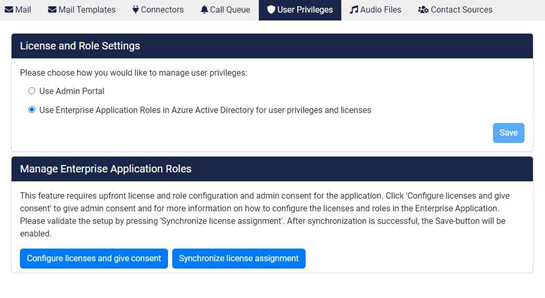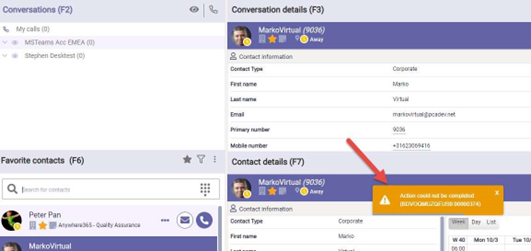This technical release bulletin provides an overview of the new features and enhancements for the indicated release of the Attendant Console for Microsoft Teams.
This bulletin is aimed at partners, not end-users. After the release has been deployed, Attendant Console users will see a one-time What’s new popup highlighting the most important functional changes. The What’s new information, relevant to the attendant user, will also be made accessible from the Help menu in the Attendant Console.
Overflow destinations [34244]
The overflow destinations for queues could only be set to PSTN numbers only. This has been extended to Teams contacts. So the overflow destination can be any Teams user in the organization. The destination can be selected via a dropdown or via a search and select.
Blind transfer to another queue [34857]
Enable attendants to make blind transfers directly to another queue. The transfer button is shown in the contact list (F6) and in the contact details pane (F7).
Manage licenses and user privileges via Azure [38781]
In the admin portal the option to manage the licenses and user privileges via Microsoft Entra ID Formerly known as Azure Active Directory (or Azure AD, or AAD) has been introduced. This means that via ME-ID Formerly known as Azure Active Directory (or Azure AD, or AAD) a license can be assigned to a user (of course there needs to be license available) and the following user privileges can be set:
- manage admin portal
- manage preferences
- manage widget
- add/edit/delete personal contacts
- add/edit/delete shared contacts
In the user manual in section 'License and User privileges via ME-ID' this is described in detail.
Performance improvements on the OMNIdir (F6) [39127/39288]
Improvement on OMNIdir
-
caching of contacts on a persistent volume: the advantage is that cache rebuild after a service restart/interruption is no longer needed.
-
Search in personal/shared contact: the improvement is especially for customers that have a large set of personal and/or shared contacts in the OMNIdir.
Ring back functionality reintroduced [39583]
Upon request of some partners/customers, the ring back functionality has been reintroduced. The ring back is by default still switched off, but can be activated on individual customer (Tenant) basis. The down side of the ring back, that the attendant console user can also briefly hear the ring back when the connection is established, is also reintroduced. The effects of this have been mitigated by making the ring back a lot less load than the Music on Hold.
In case the ring back needs to be reintroduced, please contact Support.
Warning messages added [39707]
Calling a contact that has his Teams on ‘forward all calls to voice mail’ is not possible within Teams.
When calling a user that has Forwarding to voicemail enabled, the call will be ended and the attendant will receive a warning.
When calling a user that declines the call, the attendant will receive a "Target has declined" message.
No warning message when stopping a call. [39707]
The situation in which the attendant console user initiated an outbound call and decides to end it before the destination answers, always resulted in a warning message. This warning was unnecessary, as it is an intended action of the user. The warning is no longer shown when the attendant console user hangs up a call that is not answered by the destination (or not confirmed in Teams, when running in the browser).
The error message as shown below, will therefore no longer pop up in this situation:
Improvement on overflow handling [38940]
An improvement has been made for the overflow situation: 'when maximum number of calls has been reached'. The overflowing call/calls were still showing in the F2 pane until the moment the overflow destination picks up. This has been corrected, when a call overflows due to exceeding the max number of calls, it is no longer shown in F2.
Blind transfer/Transfer to voice mail buttons [38955]
The Blind transfer and Transfer to Voicemail buttons were no longer shown after multiple (more than 2) hold/resume actions. This has been solved.
UI improvement [39031]
Users can now see their name and phone number with a tooltip when there is not enough space in the navigation bar.
Music on hold improvement [39445]
Custom music on hold sometimes was no longer audible for callers. This situation has been identified and solved.
Synchronization of External Contact Sources [39493]
In some situations the automatic synchronization of updates in an External contact file did not work. This has been corrected.
Improvement on queue calls [39786]
In exceptional cases it could happen that calls to the queue got disconnected after about 20 seconds of ringing. This situation has been identified and solved in this release
Improvement on calls on hold [39864]
In case of a brief service interruption, calls that were on hold at that moment could disappear after the connection is restored. This has been solved.






